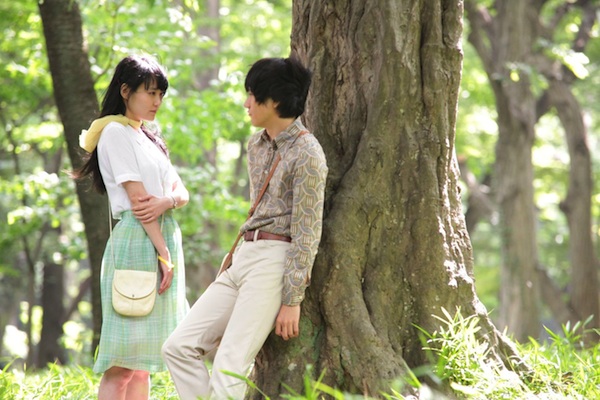Tran Anh Hung’s adaptation of Haruki Murakami’s Norwegian Wood opens tomorrow at West End Cinema. Photograph courtesy of Soda Pictures.
The work of popular Japanese author Haruki Murakami has only been adapted to film on a few occasions, and none of those adaptations have achieved significant international success. Perhaps it’s the surreal qualities that make them resistant to easy adaptation, or the fact that so much in Murakami’s stories rests between the lines: Simple translations of the plot elements can’t necessarily capture the tone of his work. French-Vietnamese director Tran Anh Hung has taken on one of Murakami’s most accessible works in Norwegian Wood, likely the highest-profile of those adaptations to date. That accessibility might make it a more likely candidate for adaptation, but given the popularity of the book, which skyrocketed the author to fame, it also probably subjects it to greater scrutiny from fans.
The plot centers on a Tokyo college student in the 1960s who’s dealing with the recent suicide of a friend, as he falls in love with two young women who are entirely different in personality, and who represent a choice he has to make between the grief of his past and the potential hope of the future. Radiohead’s Jonny Greenwood, who also wrote the fantastic music for There Will Be Blood, provides the score.
View the trailer. Opens tomorrow at West End Cinema.
A favorite at Sundance last year, Dee Rees’s first film has since been praised mostly for succeeding despite hewing a little too closely to the often predictable formulas that tend to make films popular at that festival. The film, which won the Sundance award for best cinematography, stars Adepero Oduye as Alike, a Brooklyn teen coming of age and trying to hide her sexual orientation in a household where she suspects her parents ( Kim Wayans and Charles Parnell) might not be so understanding. Her mom, not necessarily guessing that Alike and her best friend frequent lesbian clubs but suspecting that the friend might be a bad influence, inadvertently shepherds Alike into her first relationship by encouraging her to enter into a friendship with a girl from their church who turns out to be gay, as well.
View the trailer. Opens Friday at E Street Cinema.
Star Trek II: The Wrath of Khan
It’s tempting to simply leave this movie without a blurb and just quote James Tiberius Kirk, who pretty much summed up the second feature film in the Star Trek series when he uttered that immortal scream: “KHAAAAAAAANNNNNNNN!!!” But if you need any more convincing than that, this is the unquestionably the best of all the Star Trek films, following on the heels of Robert Wise’s largely unloved (and, to my mind, underrated) 1979 Star Trek: The Motion Picture, which tried to marry the adventure-heavy Trek universe with the cerebral 1970s sci-fi style kicked off by Kubrick’s 2001. In Khan, the franchise returns to its roots, resurrecting a one-episode villain from the show—played by a frighteningly buff Ricardo Montalban—a gray-maned superhuman with a score to settle with Kirk and the crew of the Enterprise for sending him into exile years before.
What this film does better than any other in the series is to re-create what Star Trek always did best: take itself way too seriously even as it secretly revels in being utterly campy. That scream from Kirk’s lips as he curses Khan to the heavens is the essence of Star Trek boiled down to a single shot: The movie plays it completely straight, even though it’s a scene of unquestionable hilarity in its earnestness and melodrama (Shatner’s delivery, as was always the case, helps to define that dichotomy). Wrath of Khan embraces the yin and the yang of the series wholeheartedly, earning its place as the most enjoyable and midnight-movie-ready installment of the series.
View the trailer. Friday and Saturday at midnight at E Street Cinema.
Jacques Tourneur may have been the biggest name in his family, but his father was in the business first— Maurice Tourneur was a jeweler turned director who got into filmmaking near the genre’s very beginning, starting his career in 1911. Tourneur took his family to New York in the teens and eventually worked his way up to a position with MGM, but his career quickly faltered when his approach proved a little too artsy for the studio. The National Gallery’s brief Tourneur retrospective features two of the films from the 1930s that he directed after returning to Europe. In this weekend’s installment, Tourneur creates a gangland drama about the titular criminal, an honor-among-thieves piece in which de Marseille tries to clean up the behavior of his fellow ne’er-do-wells.
View the film’s opening. Saturday at 12:30 p.m. at the National Gallery of Art. Free.
In 2010, Iranian director Jafar Panahi—who directed some of the most beloved films of the Iranian New Wave ( The White Balloon, The Mirror, The Circle)—was sentenced to six years in prison, and banned from making films for 20 years on ambiguous charges of illegal assembly and creating propaganda against the Islamist Republic. While under house arrest with this sentence under appeal, Panahi began filming the day-to-day activities of his life on an iPhone, and had a friend smuggle the footage out on a flash drive hidden inside a cake. In addition to going about his life and trying to navigate the appeals process, he also engages in conversations about filmmaking and art, in what will hopefully not be one of the last opportunities in a long time to hear Panahi reflect on (or create) his work. The film is the first entry in this year’s Iranian Film Festival 2012 at the Freer, which continues with new films each weekend from now through February 19.
Watch portions of the film here. Tomorrow at 7 PM and Sunday at 2 PM at the Freer. Free.
DVD/Blu-ray Pick of the Week: Mildred Pierce
Todd Haynes’s HBO miniseries of Mildred Pierce was less a remake of the old Joan Crawford movie and more a completely new appro
ach to adapting James M. Cain’s 1941 novel. Indeed, watching it, it’s easy to imagine Haynes and company never even saw the Michael Curtiz–directed 1945 films, which turned the novel into a pulpy noir murder mystery. Haynes, on the other hand, sticks closer to the text and time frame of the book (the post-Depression years, rather than the 1940s setting of the earlier film), using it to explore themes he’s been delving into throughout his career: the evolution of women’s roles in the US in the past century, and the psychological and cultural adjustments that came with that evolution. Haynes’s meticulous attention to detail is evident throughout the five-hour running time, as he paints a picture of the 1930s that feels remarkably realistic, thanks in no small part to the gorgeous production design of Mark Friedberg. The result is nothing like the Mildred Pierce you might expect. The thriller aspect is completely absent; in its place is a thoroughly engrossing drama about Pierce, played by Kate Winslet in one of the finest performances of her career, as she attempts to successfully balance being a single mother (of a horrifyingly spoiled girl, played as a teen/young adult by Evan Rachel Wood) and a successful business owner at a time when it was unusual for women to be either.
Special Features: Audio commentaries with Haynes, Friedberg, and co-writer Jon Raymond, plus some making-of materials. View the trailer:


















